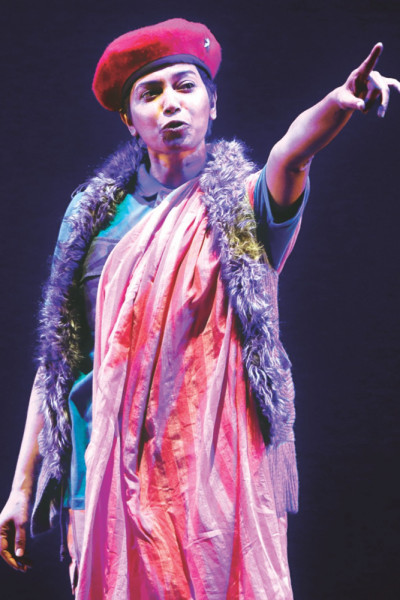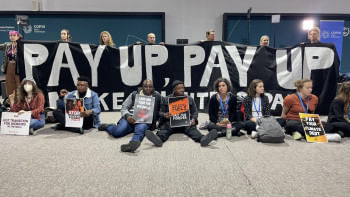“Breaking gender barriers on stage is very liberating”

BotTala may not be the biggest name in Bangladeshi theatre, but it has stood out in significance with major plays in its handling and portrayal of socio-political issues. “Crutch-er Colonel”, a serious play on Bangladesh's pre- and post-Liberation political history, will stage its ninth production today at Bangladesh Mahila Samiti's Nilima Ibrahim Auditorium. Based on Shahaduzzaman's popular novel of the same title and directed by Mohammad Ali Haidar, the production has garnered praise for its handling of such a sensitive subject matter, and the distinct style of performance where multiple actors play one character, including that of Colonel Taher.
Kazi Roksana Ruma is one of the two women in the cast, and has been in the theatre scene since 2000 when she first worked for Subachan Natya Sangsad after graduating from the-then Department of Theatre and Music from Dhaka University. After a ten-year hiatus during which she focused on her professional career in the development sector, she came back to the stage in 2010 with BotTala's “Khona”, and have been a central part of their acting roster, playing roles in their stage play “The Trial of Mallam Ilya” and a number of street plays. In a recent conversation with The Daily Star, the artiste shares her experience in theatre, and speaks about her challenges women face in the field.
“I play several characters in 'Crutch-er Colonel', including a soldier, Colonel Taher in one scene, his mother Ashrafunnesa in two or three scenes, as well as his wife Lutfa Taher. There are no fixed roles for any actor, and we maintain consistency by having the colonel don a red hat. This deliberation came from a crisis management; after adapting the play on stage, there were some actors who did not show up for the technical show. Another reason was to portray the spirit of revolution, which lies in every individual. Colonel Taher had a dream, and as with all such dreams it stemmed from a higher moral ground, therefore never being wrong idealistically.”
“There are only two women in the play, and it requires physical transformation from us to perform male roles convincingly; I have cropped my hair short for the role. Breaking gender barriers on stage is very liberating; though ironically there is still a huge gender disparity in theatre as women face many obstacles in the exploration of the arts. Our jobs often have us return home in late hours of the night, which is a social taboo for women. In my years I have noticed that people tend to bring their significant others to shows, but never their families. I believe that increased familial involvement will help counter the stigmas surrounding theatre, as much of the prejudice revolves around ignorance.”
“My first dalliance with theatre began in 1991, as a college student during my years in Pirozpur, before it grew into a passion that led me to study it in university and subsequently join Subachan. Unfortunately you cannot carve out a financially stable career out of theatre, which led to my ten-year break. In 2008, I founded AIMS, a communication organisation where we create advertising and promotional content for NGOs and other organisations in the development sector. Being my own boss enabled me to take time into my own hands, and that's how I have been able to resume my passion for theatre.”
“I was familiar with BotTola since its founding. I knew their members since my time at Subachan and used to attend their productions as a spectator. Samina Luthfa Nitra's performance in 'Khona' had me so enthralled that I watched it thrice. It never failed to move me emotionally, and I remember after the second or third time of watching the play, I approached her and said, 'I don't want to spend money anymore to shed tears.' She had to take a leave of absence to pursue studies abroad, and it was then the members of the troupe asked me to step in.”


 For all latest news, follow The Daily Star's Google News channel.
For all latest news, follow The Daily Star's Google News channel. 



Comments